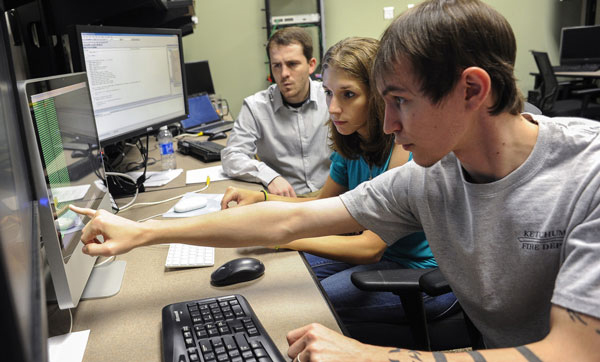Academic Programs in the Department of Computer Science
The Department of Computer Science (CS) offers a full range of bachelor’s, master’s, and Ph.D. degrees, as well as a growing number of certificates.
Undergraduate Programs
 Interested in applying computer science knowledge to another discipline? The Bachelor of Arts in Computer Science is designed for students interested in combining a broad-based liberal arts education with a strong foundation in computer science. With the ever-increasing use of computers and computer software in all aspects of human life, computer science is now an integral part of all fields of study — not just the traditional fields of science and engineering.
Interested in applying computer science knowledge to another discipline? The Bachelor of Arts in Computer Science is designed for students interested in combining a broad-based liberal arts education with a strong foundation in computer science. With the ever-increasing use of computers and computer software in all aspects of human life, computer science is now an integral part of all fields of study — not just the traditional fields of science and engineering.
Interested in a career in theoretical or applied computer and computational sciences, software engineering and commercial software development, or a science-related profession? The Bachelor of Science in Computer Science gives you a more in-depth study of computer science than the B.A. degree, with 12 more credit hours within the discipline and more rigorous math and science requirements. The B.S. program is accredited by the Computing Accreditation Commission of ABET. Read about the B.S. program's detailed educational objectives, student outcomes, and enrollment/graduation data.
Are you interested in a career foiling cybercrime, conducting crime scene searches of computers or solving cases by examining digital evidence? Do you want to protect computer systems from hackers and malware? The Bachelor of Science in Digital Forensics is designed to help students enter the fast-growing field of digital forensics. Some estimates say over 100,000 jobs will be available for cybersecurity/digital forensics personnel in the next 10 years. If you want to learn how to conduct cyber security operations and investigations, then this program is a perfect fit.
Minors are available for students who want to apply CS topics to their major field.

Master’s Programs
The Master of Science in Computer Science (MSCS) provides an extra level of knowledge above the foundation provided by the B.S. and B.A. degrees. You will receive a broad grounding in computer science as a discipline as well as an in-depth understanding of knowledge in fields of emerging importance — including cyber security, cloud computing, big data analytics, the Internet of Things, and web application development. It also offers an opportunity for students with an undergraduate degree in a closely related discipline, such as mathematics or electrical engineering, to make a transition to the computer science profession.
The Master of Science in Computer Forensics and Security Management (MSCFSM) is an interdisciplinary program. It emphasizes the key theories, practices, and foundations from computing, justice sciences, and business to address current and emerging topics in computer security, digital forensics, and cyber-crime investigation. This degree helps students seeking analyst roles in industry and governments to fill crucial gaps in the nation’s capacity for critical infrastructure protection, privacy, and the safety of e-commerce. MSCFSM graduates go on to solve real-world problems such as tracking online criminals, identifying malware provenance and attack vectors in computer systems, and conducting specific criminal investigations where computers, the Internet, and e-commerce are involved.
PhD Program
 The Doctor of Philosophy program in Computer Science (PhDCS) prepares you for a life-long career in scientific inquiry and also to work in industry where rapidly evolving computer science drives the 21st century world economy. Program students produce the greatest impact on the department's research program, as well as in the broader community, by becoming researchers, teachers, scholars, and entrepreneurs. Our graduates go on to solve problems such as new ways to build large-scale secure software systems, mine “big data” from the Internet, investigate and defend against cyber-crimes, create innovative visualization and graphics solutions, advance the use of modern IT infrastructure such as cloud computing, and pursue inquiries at the frontiers of computer science.
The Doctor of Philosophy program in Computer Science (PhDCS) prepares you for a life-long career in scientific inquiry and also to work in industry where rapidly evolving computer science drives the 21st century world economy. Program students produce the greatest impact on the department's research program, as well as in the broader community, by becoming researchers, teachers, scholars, and entrepreneurs. Our graduates go on to solve problems such as new ways to build large-scale secure software systems, mine “big data” from the Internet, investigate and defend against cyber-crimes, create innovative visualization and graphics solutions, advance the use of modern IT infrastructure such as cloud computing, and pursue inquiries at the frontiers of computer science.
Questions?
We invite you to investigate the programs that interest you. If you have any questions, please fill out the Contact Us form or email us at